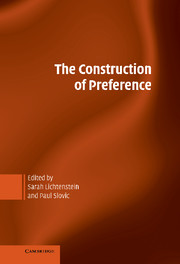Book contents
- Frontmatter
- Contents
- Contributors
- Preface
- Acknowledgments
- I INTRODUCTION
- II PREFERENCE REVERSALS
- III PSYCHOLOGICAL THEORIES OF PREFERENCE REVERSALS
- IV EVIDENCE FOR PREFERENCE CONSTRUCTION
- V THEORIES OF PREFERENCE CONSTRUCTION
- VI AFFECT AND REASON
- VII MISWANTING
- VIII CONTINGENT VALUATION
- IX PREFERENCE MANAGEMENT
- 34 Measuring Constructed Preferences: Towards a Building Code
- 35 Constructing Preferences From Labile Values
- 36 Informed Consent and the Construction of Values
- 37 Do Defaults Save Lives?
- 38 Libertarian Paternalism Is Not an Oxymoron
- References
- Index
38 - Libertarian Paternalism Is Not an Oxymoron
Published online by Cambridge University Press: 05 June 2012
- Frontmatter
- Contents
- Contributors
- Preface
- Acknowledgments
- I INTRODUCTION
- II PREFERENCE REVERSALS
- III PSYCHOLOGICAL THEORIES OF PREFERENCE REVERSALS
- IV EVIDENCE FOR PREFERENCE CONSTRUCTION
- V THEORIES OF PREFERENCE CONSTRUCTION
- VI AFFECT AND REASON
- VII MISWANTING
- VIII CONTINGENT VALUATION
- IX PREFERENCE MANAGEMENT
- 34 Measuring Constructed Preferences: Towards a Building Code
- 35 Constructing Preferences From Labile Values
- 36 Informed Consent and the Construction of Values
- 37 Do Defaults Save Lives?
- 38 Libertarian Paternalism Is Not an Oxymoron
- References
- Index
Summary
Consider two studies of savings behavior:
Hoping to increase savings by workers, several employers have adopted a simple strategy. Instead of asking workers to elect to participate in a 401(k) plan, workers will be assumed to want to participate in such a plan, and hence they will be enrolled automatically unless they specifically choose otherwise. This simple change in the default rule has produced dramatic increases in enrollment (Choi, Laibson, Madrian, & Metrick, 2002; Madrian & Shea, 2001).
Rather than changing the default rule, some employers have provided their employees with a novel option: Allocate a portion of future wage increases to savings. Employees who choose this plan are free to opt out at any time. A large number of employees have agreed to try the plan, and only a few have opted out. The result has been significant increases in savings rates (Thaler & Benartzi, 2004).
Libertarians embrace freedom of choice, and so they deplore paternalism. Paternalists are thought to be skeptical of unfettered freedom of choice and to deplore libertarianism. According to the conventional wisdom, libertarians cannot possibly embrace paternalism, and paternalists abhor libertarianism. The idea of libertarian paternalism seems to be a contradiction in terms.
Generalizing from the two studies just described, we propose a form of paternalism, libertarian in spirit, that should be acceptable to those who are firmly committed to freedom of choice on grounds of either autonomy or welfare.
- Type
- Chapter
- Information
- The Construction of Preference , pp. 689 - 708Publisher: Cambridge University PressPrint publication year: 2006
- 2
- Cited by



